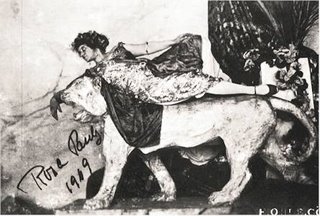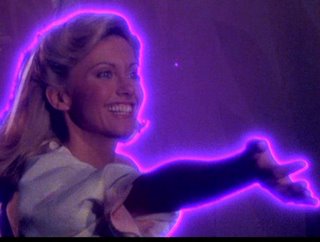I suspect it's dialectal. Teutonoform strong verbs are a dying breed, anyhow.
I just came as close as I have in years to enacting the fanboy ritual of getting my program signed.
This was a relaxed, non-tired-from-work, matinee experience, different in feel from the fever dream of a buzzy opening night, but probably equally satisfying. It was the cushiony couch of contentment rather than the wild ride of discovery, delirium, &c.
Flipping through almost-signed program, by the way, we find that Anna Netrebko is frequently compared to Callas (premature much?) and that the Met is presenting the Magic Flute in a new English translation. There's about a 10% chance that's good news, if you ask me. Singing translations are second to maybe military occupations of sovereign nations in terms of likelihood of going horribly wrong. And, not to always privilege the dead over the living, there's always that English translation by that Auden fellow...
Did I say Don Carlo was (narratively) in an emotionally irretrievable medium? Because opera seria, now that's some hard shit to get really exercised about. And on top of everything else, there's no applause window after two of Ilia's big numbers.
This shows a particular lack of foresight on Mozart's part when Ilia is Dorothea Roschmann. Note to Mozart: Roschmann needs an applause window. Just give us a V-I and hold your horses with the recit. Don't let it happen again. Remember the time I said I wasn't going to use food metaphors for singing because it's facile and overly subjective? I'm going to do just one, just to keep a hand in. Dorothea Roschmann's voice is like raspberry puree served in an ivory dish made from the tusk of the last elephant and slurped up through a straw made of pink diamonds. Don't you think?
The weird thing is I'm not exactly sure what I want to hear her sing. The Countess, no doubt, Figaro
and Capriccio. Daphne? A soprano Oktavian? (Shuddup, JSU.) Jenufa? Ok, here's my answer: anything she wants to sing. She gives the impression of a singer who nailed up her technique so long ago she is able to devote absolutely all of her energy to making it art.
The very best thing was maybe the duet with Kozena, about whom I have probably enthused to the point of great tiresomeness. Idamante wasn't as fulfilling as Dorabella, but it sure was an easy sing (which I noted in particular after Kirstine Jepson's interesting intermission chat the other day, in which she told Maggie J. something to the effect of "after the first time I got out there and sang ''non ho colpa" I called all my mezzo friends and asked, "why didn't you tell me how hard it is?!" p.s. have I mentioned how relaxed and engaging MJ seems as an interviewer? I feel inclined to weigh in after all the ludicrous moaning about her first season as an announcer) She and Roschmann reminded me of those postwar central European Mozart singers, actually, in many ways I can't quite put words to right now.
The two of them did absolutely all you could to inhabit the stylized storytelling of opera seria, although in this they may have been outshone by Alexandra Deshorties, vocally much, much improved since last I heard her. I can't say I love the basic sound but she's doing a lot with it and has really worked out a kind of fluid stage comportment for herself. D'Oreste was pretty nuts. She's the only member of the cast who seems to have hired a drag queen consultant for hand-movement seminars, which is too bad for the rest of them. Idomeneo, more than most operas, needs a little Paris is Burning to get things going.
I don't have a hell of a lot to say about Kobie van Rensburg. Wasn't at all disappointed, but there wasn't some moment I wanted to run home and tell everyone about. At the risk of relegating everyone else to a sum-it-up paragraph, here, Jeffrey Francis displayed admirable flexibility as Arbace, and Simon O'Neill tore it up pretty good as the high priest of Neptune. There was no real weakness in this cast, down to the Cretans (including an auditions favorite from a few years ago, the sweet-voiced Lisette Oropesa and ubiquitous and quite talented bass Andrew Gangestad, who I knew vaguely years ago and is also a nice fellow.)
By the way, my sources in the front row report that when the crown fell off Kozena's head in the last minutes of the opera, she was visibly almost cracking up, which I wish I'd seen. Everyone else just stood around in a very stately manner, trying to pretend that the Fumbling of the Crown is part of any first-rate coronation.
Tuesday's Boheme, and isn't there a Rigoletto this week? Opera burnout, here I come!
Bonus (?) chat-post. Kind of like a commentary track you'd never pay extra for:
JSU: netrebko callas?
JSU: ha ha ha
Maury: seriously
JSU: ha! no, you kid
Maury: and I
like her
JSU: they're both skinny!
Maury: they're both from east of the mississippi. i dunno, i just report.
Maury: "to whom Netrebko is routinely compared" says the program
Maury: did you like my shout-out about soprano strauss roles? :)
JSU: yeah, but you picked the wrong one ;)
JSU: i'd prefer her marschallin...
JSU: oh, btw
JSU: i realized why i didn't think kozena was a soprano
Maury: the marschallin is a less interesting sing.
Maury: why?
JSU: cause she wasn't any good in mahler 4
Maury: ah
Maury: i missed it
JSU: with the hub
Maury: you suggested roeschmann as komponist, no?
JSU: yes
JSU: rosenkav is a lot beefier
JSU: it's really a jugendlich role
Maury: i can never tell who will look dumb as a boy, though. i thougt kozena would.
JSU: as a boy, she looks like a boy
JSU: which, if you think about it, is unsurprising, considering her shape
JSU: roeschmann may look a bit like flagstad in fidelio or something tho, it's true
Maury: give me a heterosexual perspective: she's actually totaly hot, right? not just opera hot?
JSU: yes
JSU: and
JSU: both ways, she looks like an extra from the lord of the rings
Maury: that's disturbing
JSU: well, i was thinking about this thru 90% of her baroque recital last yr (maggie k)
JSU: wait
JSU: you didn't mention stephen milling!
JSU: neither did i, mind you
Maury: i'm not sure why i said te duet with koz was the best part, except as a transition. ilia's arias really were the best part.
JSU: i thought elettra's first was the best part ;)
JSU: well, maybe not, but close.
Maury: huh
Maury: i have trouble with her voice
JSU: somehow, it's what's been stuck in my head since wednesday tho
Maury: love her hand gestures
JSU: yeah, the top is still artificial, even if it's solidified
JSU: but it works, and there's a menacing boom somewhere near the bottom, so who cares
JSU: 2 more chances!
Maury: no, i liked it but i'm not really up for another idomeneo
Maury: i did just pull Cestina Hrou (Czech for Fun!) off the shelf in case i need to express my approval to MK
Maury: hezka hudba=beautiful music, i think
Maury: velmi krasna hudba. very beautiful music. i don't feel like going through the book looking for the preterite so i can say "that was". I have forgotten most of the 1 quarter of Czech I studied
[minor deletion about Boheme to protect the innocent]
JSU: in fact, it's the only safe one with her to see, since the first is 'conducted' by domingo and the second is singles night (gaaaaak)
Maury: they should make jenufa singles night [which, credit where it's due, was I may have been
Jonathan's idea.]
JSU: bluebeard's castle ;)
Maury: american tragedy? :)
JSU: btw, you didn't blog kozena's ornamentathon
JSU: is it more ok in opera seria?
Maury: oh, true. in opera seria it doesn't...jinx


